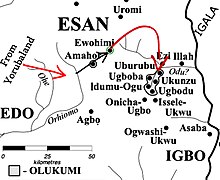Olukumi people
 Migration pattern of the Olukwumi | |
| Total population | |
|---|---|
| Unknown | |
| Regions with significant populations | |
| Nigeria | |
| Languages | |
| Igbo, Olukumi. | |
| Religion | |
| Christianity | |
| Related ethnic groups | |
| Igbo, Yoruba, Esan. |
The Olukwumi people are a subgroup of the Anioma people of the Aniocha North area of the Delta State, Nigeria. (Not to be mistaken for the Lucumí religion, one of the terms used to refer to Yorùbá-derived religion in Cuba.)
The Olukwumi occupy eight communities west of the Niger river, and are together known today as the Odiani Clan in Aniomaland. Ukwu Nzu (Eko Efun) town is the historical headquarters of the Olukwumi people and is traditionally headed by the Obi of Ukwu Nzu, Agbogidi. The present Obi is H.R.M. Obi Ogoh 1. Olukwumi villages select leaders through the Okpala Obi system, which is the Okpala (gerontocracy) of the Igbo. The Anioma people are the Igbo subgroup from Aniocha (Enuani and Olukwumi), Ndokwa (Ukwuani), Ika, and Oshimili areas of Delta State.
Geography
The Olukwumi are native to an area just west of the Niger River's right bank. The area is rich in Chalk and Kaolin deposits which is known as "Nzu" in Igbo language and "Efun" in Yoruba, which has been traditionally mined and used by the people of the area for various cultural purposes.
Etymology

The word Olukumi is said by some to mean "My confidant" or "My friend" in Yoruba.
History
According to Olukwumi oral tradition, Olukwumi are is a blend of aboriginal Igbos and migrants from the Owo, Akure or the Akoko, depending on the Olukwumi town in question.
Due to the subsequent blend and proximity of their settlements with Enuani speakers,[citation needed] [when?] they today speak both the Olukwumi and Enuani dialect dialects of Igbo language. Prayers and recitals in their native dialect are also being encouraged, while making conscious efforts to speak the language to their children and in their communities as a whole.[citation needed] Of the towns in the Odiani clan, only Ugbodu and Ukwu-Nzu are bilingual;[citation needed] the rest are solely Enuani-speaking.[citation needed]
According to a report in the Sunday Tribune of October 24, 2010, they have also started to organize recitation and oratory quizzes and competitions in Olukwumi to preserve the dialect.[citation needed] Linguists are also documenting the language. For 40 years, Chief G B Nkemnacho, a lawyer of Olukwumi origin has documented his people's history as told by its elders as life experiences and oral tradition.[1]
Olukumi towns and communities
| s/n | Town | Origins | Comment(s) |
|---|---|---|---|
| 1 | Ukwu Nzu | Igboland and Owo | Ukwu Nzu is the Head of the Odiani clan who founded Olukwumi Town. |
| 2 | Ugbodu | Igboland, Akure, and Owo (Ogho) | Traditional centre of Olukwumi people. |
| 3 | Ubulubu | People from Ugbodu and Ukwu nzu | A relatively late Olukwumi town said to have been founded in 1800 by some Ugbodu people later joined by others from Ukwu nzu. |
| 4 | Idumu Ogo | ||
| 5 | Ugboba (Ugbo Oba) | ||
| 6 | Ogodor | ||
| 7 | Ogbe Onei (Obomkpa) | ||
| 8 | Anioma |
Non-Olukumi villages
| s/n | Town | Origins | Comment(s) |
|---|---|---|---|
| 9 | Onichaku (Ubulu Uku) | ||
| 10 | Ogbekenu villages of Onicha-Ugbo |
Language
Notable Olukwumi People
- Nduka Ugbade - (Former Nigerian football star and coach)
- Helen Anyamelune - (1958' Miss Nigeria)
- Chinedum Mordi - (First Professor from Ugbodu, lectured at Delta State University, Abraka
See also
References
- ^ Augustine Senan Ogunyeremuba Okwu (2010). Igbo Culture and the Christian Missions, 1857-1957: Conversion in Theory and Practice. Rowman & Littlefield. p. 13. ISBN 9780761848844.
